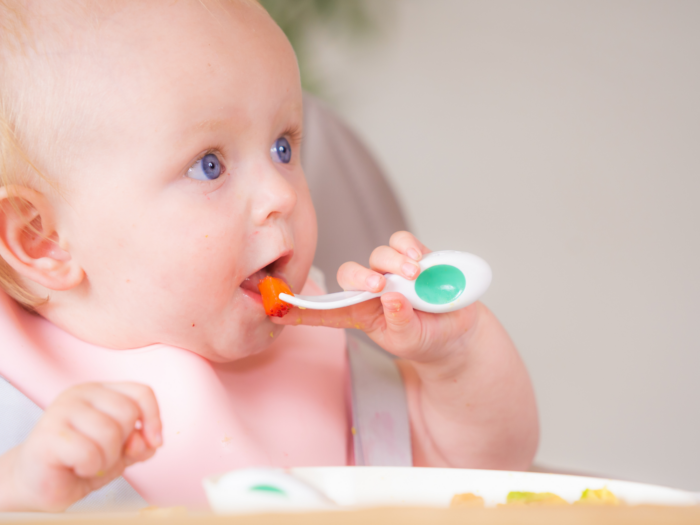Like any new skill, learning to use cutlery or utensils takes time for your baby to master.
Here's Jessica Rapp Irwin, M.S., OTR/L, RYT and Founder of Rooted in Routine with some helpful utensil use milestones.
"When your baby starts eating solids, you quickly realize there is a lot that goes into mealtimes - the actual food is just one piece of the puzzle! Helping your baby learn to use a spoon, fork, and knife is another huge part as well. The first step to this is educating yourself all about utensil use milestones. Eating with utensils requires immense hand-eye coordination, fine motor strength, and problem-solving. It takes lots of repetition for your baby (and patience for you) for this to occur! Wondering when you can expect your baby or child to be able to eat with utensils? Here are the average developmental ages where babies and children tend to meet each milestone.
6-12 Months:
- Grabs for spoon when held out in front of them
- Sucks or gnaws on both ends of spoon
- Pokes spoon around in mouth
- Bangs spoon on table
- Throws or drops spoon onto floor
- Brings pre-loaded spoon to mouth when held in front of them or placed down on table
12-18 Months:
All of the above, plus…
- Dips spoon into food and brings to mouth (may spill a lot!)
- Holds spoon or fork in one hand while hand-feeding with the other hand
- Scoop food with spoon and bring to mouth more consistently (closer to 18 months)
18-24 months:
All of the above, plus…
- Attempts to stab food with fork and bring to mouth (may “miss”)
- Motivated to feed themselves, doesn’t want help
2-3 years:
All of the above, plus…
- Can feed themselves with both spoon and fork
- Begins to hold utensils with fingertips, rather than fist
4-6 years:
All of the above, plus..
- Can cut with a long-handled knife with supervision
If you’re wondering what kind of utensils are best for your baby to start with, the answer is ones that have a short, wide handle - exactly like doddl! This is because a baby’s small hands cannot effectively manage a longer, thinner handle. doddl’s utensil handles are designed to be short and contoured so that your baby can easily grab onto it and bring it to their mouth. This helps your baby feel confident, which is key to progressing with self-feeding. When your baby feels confident AND has the opportunity to practice with the right utensils, they typically meet their utensil use milestones within the average ranges.

The doddl baby utensil set is the perfect introduction to cutlery, suitable for 6 months+
Some general mealtime tips to help your baby or child progress with the above skills:
Model using utensils in front of your baby. I cannot stress this one enough! Eat with your baby and use your own spoon or fork. They will learn best by watching you. Try not to correct the way they use or hold the spoon - this can lead to frustration and shutting down, which we do not want. Choose a first utensil set for your baby that helps promote baby’s development - a short, wide handle is the easiest for your baby to grab onto. That is why I LOVE the doddl baby utensil set. When just starting solids, have two or three spoons out on the table at the beginning. This is helpful when your baby inevitably drops or throws the spoons. When your baby drops one spoon, you can ignore it, and simply begin using another. This takes attention away from the dropping, which is good in the long-term to prevent that behavior from going on for longer than is developmentally-appropriate.
Don't worry!
As you can see, there is definitely a range for each skill set. Do not panic if your baby or child isn’t meeting every single one of these milestones exactly as listed above. Rather, this is a general guideline to keep YOU on track for observing your child. If you feel concerned that your baby or child is not meeting many of the milestones listed, do not be afraid to reach out to your child’s pediatrician or other medical provider. Pediatric services, such as occupational therapy, can help!" And remember - mealtimes are about more than simply what your child eats or whether they can use a spoon or a fork. Mealtimes are a time to connect and bond with your family and do not have to be a battle."
If you’re seeking more information or help about baby and child mealtimes, head over to doddl’s parenting tips and advice and check out Jessica’s website Rooted in Routine.
Jessica is a childhood routine expert, pediatric occupational therapist, and lover of all things child development. She founded Rooted in Routine to help parents learn simple, easy to implement routines for optimal child development at every age. Her approach is largely rooted in going back to the basics to help you establish solid, age-appropriate routines for your child for things like mealtimes, play, potty, and sleep. She believes this is the most important foundation you can provide for your child - and she wants to help you do just that!


